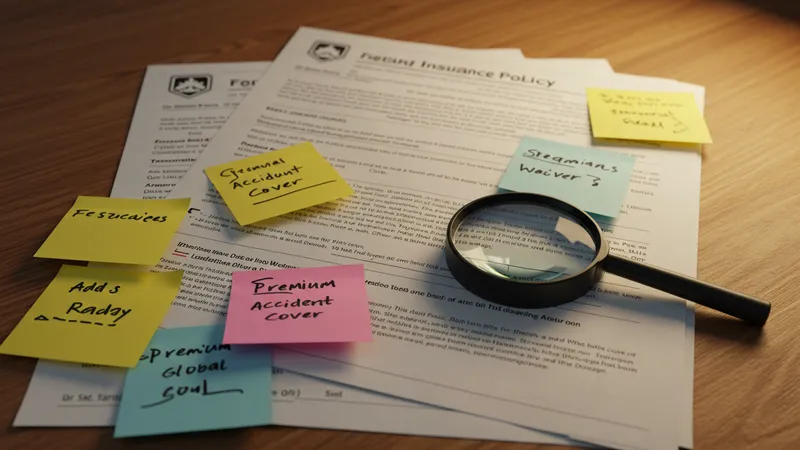

Did you know that every 60 seconds, an accident drastically changes someone's life forever? As more unpredictable and potentially catastrophic events unfold worldwide, understanding accident & casualty insurance is no longer optional—it's essential.
Now, more than ever, protecting against the unforeseeable isn't just wise—it's necessary. With an increasing number of people facing financial ruin post-accident, this topic might just hold the key to your future well-being.

Consider this: a staggering 40% of people experiencing accidents hadn't reviewed their coverage in over five years. This oversight led to unexpected expenses and heartache. But that’s not even the wildest part – many didn’t even realize their policies had expired!
An exhaustive survey revealed an unsettling truth—more than half of those surveyed misunderstood their own policy’s terms. This misconception has led to denied claims and mounting medical bills. However, within this confusing world of insurance, there lies an unexpected savior. But what happens next shocked even the experts…
Understanding the nuances of accident & casualty insurance can unlock several hidden benefits. Many don't realize that the right coverage can help with loss of income, which is a lifeline during recovery. By choosing a comprehensive plan, you ensure that an accident doesn't mean financial disaster. But there’s more to uncover in the fine print...

Another overlooked aspect is the detailed personal liability protection offered by certain policies. It's not just about your well-being; it involves safeguarding your assets against legal claims. With the right coverage, you can rest easy knowing your family's future isn't jeopardized. What you read next might change how you see this forever.
Many consumers miss out on discounts when bundling different types of insurance through the same provider. This little-known insider tip can lead to substantial savings. It's crucial to explore all options, as you might find a bundle that covers everything at a fraction of the cost. But there’s one more twist to consider...
Insurance isn't just about the right policy; it's about timing. Securing policies during promotions or rate drops can be your secret weapon against steep premiums. Timing your update attentively can seal your financial protection. This might be the missing piece to your well-rounded protection strategy.
Many assume younger, healthier individuals don't need accident insurance, but statistics point to accidents being a leading cause of death even among the young. This misconception contributes to a false sense of security that might hurt more than it helps. The harsh reality is that anyone can face an unexpected misfortune.

Another myth is that diligent savers don't need insurance, but even a robust savings account can be wiped out by significant medical expenses or lawsuits. Insurance offers a safety net that savings alone cannot provide. This misconception could be devastating financially if not corrected.
Some believe all insurers are the same, leading them to choose based solely on price. However, not all policies offer the same protection, and opting for the cheapest policy could leave you vulnerable. It's crucial to compare coverage details and know your policy inside out. Just wait—there’s an unorthodox approach you might not have considered...
Finally, people think reviewing their policy once means they’re in the clear. Policies and personal situations change, and keeping them updated is vital to ensuring optimal protection. Regularly reviewing and adjusting your policy can provide peace of mind like nothing else can.
The devil is in the details, and ignoring policy fine print can be costly. For example, many aren't aware of clauses like coverage limits or exclusions that can heavily impact a claim. Understanding these nuanced details can make or break your financial protection.

Some policies include little-known benefits, such as coverage for travel accidents, but without careful reading, these perks are often overlooked. An in-depth exploration of terms can reveal hidden benefits, ensuring you exploit every aspect of your coverage fully.
Another critical element is the insurer's responsibilities, which often go unnoticed. Knowing what an insurer must do if you file a claim is crucial, as this determines how smooth your process will be. Avoid surprises by understanding these terms clearly.
Minor details, like the timing of claim filing or required documentation, can stall or invalidate claims if mishandled. Being meticulous in understanding these requirements is essential for a smoother claims journey. But there's another twist: unseen fees embedded in policies...
Technology is reshaping the insurance landscape, making once-complex processes more streamlined and accessible to policyholders. With AI-powered analysis, insurers can now offer tailored policy suggestions with unprecedented accuracy. However, this innovation isn't without its own set of challenges.

These advancements have also raised data privacy concerns, as insurer databases become richer with personal data. Balancing convenience with privacy is a critical conversation that every policyholder should be engaged in. As tech evolves, staying informed is vital.
Digital tools and apps allow policyholders real-time monitoring of their policies and claims, enhancing transparency and control. This empowerment helps avoid negative surprises, as you can stay updated with the latest changes and coverage details.
Online platforms improve the claims process speed, minimizing downtime post-accident. However, reliance on digital methods sometimes misses the human touch necessary for complex situations. Knowing when and how to leverage tech can enhance your insurance experience remarkably.
From commuting routes to hobbies, various lifestyle choices can significantly impact your insurance premiums. For instance, a longer daily commute might increase your premium due to exposure risks, whereas working from home could offer discounts. These factors reveal a tailor-made aspect impacting premiums in unexpected ways.

Engaging in extreme sports or having hobbies considered risky can inflate your premiums. Yet, conversely, leading a healthy lifestyle through preventive health measures can lower them. Understanding this dynamic is crucial to managing your insurance costs effectively.
Sometimes policyholders are unaware that even their credit score can influence premiums. Insurers often consider these scores to assess the risk of an applicant. Enhancing your financial habits can reflect positively on your premiums.
Making the right lifestyle adjustments can lead to healthy rebates or discounts on policies. When approached holistically, the way you live can present opportunities for premium reductions without compromising coverage. But there's another surprising connection worth exploring...
Under-insurance, or having insufficient coverage, poses a significant risk that’s often underestimated. Many are unaware that their current policy limits might fall short during major incidents, leading to massive financial burdens. Unveiling this gap should be a priority for everyone.

Policy limits need constant evaluation to ensure they align with your actual needs. No one wants to discover gaps during a crisis, as these could double or triple personal losses. An awareness of coverage adequacy is crucial to avoid devastating under-insurance effects.
The environment's dynamic nature, such as climate change, has intensified certain risks, making existing coverage insufficient over time. Updating policies regularly in response to these changes can offer better security. Regular reviews are more important than ever.
The misunderstanding that a "standard policy" covers all bases can also heighten risks. Variability in needs and threats means customizable plans often provide better protection. This revelation may turn conventional thinking about insurance upside down.
Fraud is prevalent in the insurance sector, with scams surging through deceptive claims or inflated policies. Many never suspect they could fall victim to these schemes, but a surprising number are entangled unsuspectingly.

These deceptive practices can spike overall premiums for everyone, as insurers try to cover fraudulent payouts. A comprehensive understanding of red flags can help you avoid contributing to this cycle inadvertently. Awareness is the first deterrent.
Insurers use complex algorithms for fraud detection, attempting to minimize scam impacts. But staying informed of common tactics can safeguard your interests too. Being proactive in protection against fraud stops you from being caught in a financial trap.
It's crucial to report any suspicions promptly, as even minor suspicious activity could help uncover broader fraud issues. Collaboration and vigilance are key to significantly reducing fraud instances and protecting oneself and others in the insurance pool.
When evaluating policies, add-ons aren't simply upsells but can offer essential coverage not included in standard plans. These include personal accident cover, health protections, and more—offering peace of mind for specific scenarios.

Some see additions like 'premium waiver' or 'global accident cover' as unnecessary. But under specific circumstances, these can provide indispensable support, justifying their cost when activated. Proper evaluation of add-ons should be central to policy planning.
Ask yourself which scenarios are probable and which might be far-fetched. Making informed decisions ensures money spent on add-ons provides value and not just perceived coverage. This strategic approach optimizes insurance effectiveness.
Comparing policies with and without add-ons can offer insight into the real benefits extended. Often, a slight increase in cost significantly enhances the benefit margin, providing robust coverage that can serve as a lifeline in crisis situations.
Filing a claim may seem straightforward, but many face shocking hurdles that insurers don't emphasize. Delays, unanticipated restrictions, and self-inflicted errors can prolong or negate settlements, complicating what seems straightforward.

Claim denials are often rooted in simple documentation oversights or misunderstood policy terms. Being meticulous and informed is your shield against these adversities. Understanding the importance of flawless paperwork cannot be overstated.
The convoluted communication process with insurers can also lead to settlement fatigue. Proactive engagement, clarifying queries, and documenting every step strengthens your position during disputes. Knowing these strategies could streamline your claims significantly.
Some insurers offer resolution services to expedite processes, but it's imperative to distinguish between helpful services and mere marketing claims. Using them wisely ensures smoother experiences and less stress during claims, introducing a layer of comfort in trying times.
Revolutionizing the industry, predictive analytics and virtual assessments promise unprecedented efficiency by the next decade. These trends aim to streamline processes and customize policies unique to each holder's needs.

Environmental factors are redefining risk assessments, prompting insurers to innovate new models compatible with climate realities. As the earth changes, adapting insurance structures is vital, suggesting a shift towards dynamic, responsive coverage.
Blockchain technology speaks of assured transparency, offering immutable records that ensure honesty in transactions. As this becomes mainstream, expect clearer, more trust-laden interactions between insurers and clients.
Consumer demand for sustainability could drive insurers to prioritize green options, integrating eco-consciousness into policy frameworks. This progressive pivot aligns products with growing global demands, reshaping how we perceive insurance functions.
Stories abound of how insurance generously stepped in, preventing complete financial devastation during accidents. Families recount their gratitude, feeling saved from impending ruin but the opposite stories dwell within our minds too—shocking ones.

However, horror stories around stalled claims or inadequate coverage run parallel. Individuals face immense distress when their supposed safety nets become bureaucratic nightmares. These tales shed harsh light on the importance of policy literacy.
Many find catharsis in sharing experiences, hoping to drive awareness and improvements. Such narratives paint a widescale picture of gratitude and chagrin, urging others to be more prudent and thorough in their decisions.
As personal testimonies mold public perception, they steer insurance evolution towards user-friendly, accessible, and transparent models. Listening to these stories contributes significantly to understanding insurance's true, multifaceted impact.
Experts argue that the insurance sector needs a seismic shift in transparency, suggesting reforms for clearer consumer understanding dynamically. Such insights may innovate groundbreaking policies that will revolutionize the industry.

Analysts recommend a proactive consumer approach, advocating for personal risk audits and active involvement in choosing insurance products suiting unique needs. Their foresight encourages a more empowered, decision-capable policyholder base.
Economists predict potential pricing turbulence as market competition intensifies, stressing that proactive market research can save money and offer better sector bargains. Keeping pace with market fluctuations heightens your negotiation power.
Insiders suggest embracing technology's endless possibilities to enhance insurance engagement, proposing tools that demystify coverage complexities. Staying informed ensures appreciating insurance's benefits and limits without second-guessing.
Start by evaluating current lifestyle needs and potential risks comprehensively—then match them with personalized policies, not generic ones. This attentive approach can unlock maximum value.

Periodic review of policies with professional advice ensures continuous relevance to one's circumstances. Involving financial advisors or insurance consultants can lead to opportunities for strategic updates or savings.
Consider deductibles strategically—higher deductibles can offer lower premiums but mean covering more out-of-pocket in events. Balancing deductible levels involves careful future projection and financial readiness.
Finally, engage in community discussions, attend forums, or seek seminars on insurance literacy. Popular knowledge bases can clarify second thoughts or misunderstandings, leading you toward smarter choices and untangling complex scenarios.
Accident & casualty insurance, a seemingly mundane topic, holds the power to either devastate or save drastically, depending on invisibly tiny decisions. Protecting oneself requires vigilance, knowledge, and willingness to adapt. Share this crucial understanding to champion informed communities and safeguard futures.